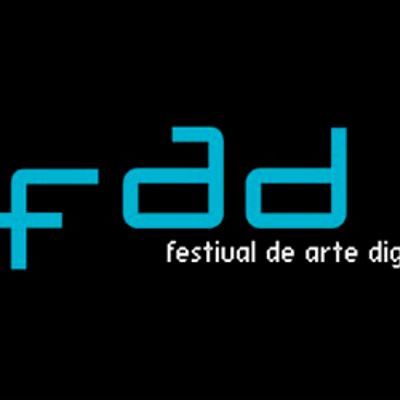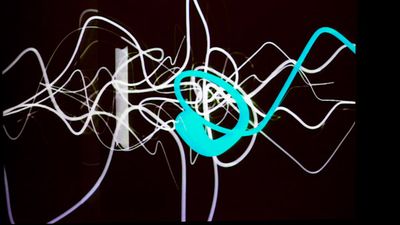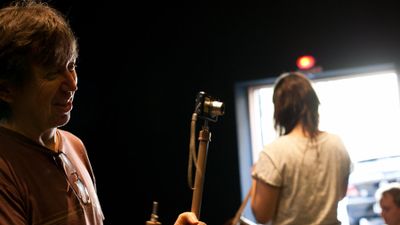
About FAD
Festival de Arte Digital (Digital Art Festival)
by Henrique Roscoe and Tadeus Mucelli
(Directors and Curators)
The Digital Art Festival – FAD –
is a project on the inventive exploration of new technologies in the field of art and communications. One of festival’s axes is the exhibition of audiovisual installations, performances and further presentations which emphasize electronic art produced by machines and software, by means of digital medias. The festival also contributes to the formations of young creators through symposiums, workshops and lectures...About FAD
Festival de Arte Digital (Digital Art Festival)
by Henrique Roscoe and Tadeus Mucelli
(Directors and Curators)
The Digital Art Festival – FAD –
is a project on the inventive exploration of new technologies in the field of art and communications. One of festival’s axes is the exhibition of audiovisual installations, performances and further presentations which emphasize electronic art produced by machines and software, by means of digital medias. The festival also contributes to the formations of young creators through symposiums, workshops and lectures given by national and international artists.
Actions such as FAD have been promoting the growth in the creation and exhibition, in Brazil – still incipient – of experimental art works created from digital technology. The production of electronic art and contemporary digital media finds in the festival one of its main dissemination channels. Since 2007, the FAD offers to the public the best of the Brazilian and international production, thus contributing to the incentive to exhibition and proposing a meditation on the current electronic art production in Minas Gerais, Brazil and the world.
Specifically in its state and capital, the festival has a fundamental role in the development in the new media scenario. While expanding the national agenda for events that focus on the fusion between art and technology, FAD brings previously unseen works to the country, and also enables the local audience to see works from local artists that have been exhibited in other states and abroad. The public responds with a growing interest in digital production and digital language, despite not being directly connected to their repertoire and cultural traditions, since they are already a part of their daily life through popular platforms such as cellphones, internet or tablet devices.
A pioneer in this genre in the state, the festival fulfills the role of creating programs of artistic content, giving the general public access to new tendencies and manifestations, as well as promoting and contributing to the formation of new talents and concepts. The festival also has the issue of access to information and knowledge as its primary goal. If on the one hand this has become easier with new technologies, globalization and the speed of data transmission, on the other, social and financial factors, as well as the lack of knowledge regarding the potential of these new technologies and their creators, prevent part of the population from benefiting from digital technologies. The complexity of this issue concerns the popularization of not only their support, but also of their content, code and languages.
The festival also allows for the interaction between professionals from different fields, such as musicians, directors, producers, photography directors, designers, communication scholars, companies in the of technological, video and cinema fields; as well as the interaction of these professionals with the public.
Festival de Arte Digital (Digital Art Festival)
by Henrique Roscoe and Tadeus Mucelli
(Directors and Curators)
The Digital Art Festival – FAD –
is a project on the inventive exploration of new technologies in the field of art and communications. One of festival’s axes is the exhibition of audiovisual installations, performances and further presentations which emphasize electronic art produced by machines and software, by means of digital medias. The festival also contributes to the formations of young creators through symposiums, workshops and lectures...About FAD
Festival de Arte Digital (Digital Art Festival)
by Henrique Roscoe and Tadeus Mucelli
(Directors and Curators)
The Digital Art Festival – FAD –
is a project on the inventive exploration of new technologies in the field of art and communications. One of festival’s axes is the exhibition of audiovisual installations, performances and further presentations which emphasize electronic art produced by machines and software, by means of digital medias. The festival also contributes to the formations of young creators through symposiums, workshops and lectures given by national and international artists.
Actions such as FAD have been promoting the growth in the creation and exhibition, in Brazil – still incipient – of experimental art works created from digital technology. The production of electronic art and contemporary digital media finds in the festival one of its main dissemination channels. Since 2007, the FAD offers to the public the best of the Brazilian and international production, thus contributing to the incentive to exhibition and proposing a meditation on the current electronic art production in Minas Gerais, Brazil and the world.
Specifically in its state and capital, the festival has a fundamental role in the development in the new media scenario. While expanding the national agenda for events that focus on the fusion between art and technology, FAD brings previously unseen works to the country, and also enables the local audience to see works from local artists that have been exhibited in other states and abroad. The public responds with a growing interest in digital production and digital language, despite not being directly connected to their repertoire and cultural traditions, since they are already a part of their daily life through popular platforms such as cellphones, internet or tablet devices.
A pioneer in this genre in the state, the festival fulfills the role of creating programs of artistic content, giving the general public access to new tendencies and manifestations, as well as promoting and contributing to the formation of new talents and concepts. The festival also has the issue of access to information and knowledge as its primary goal. If on the one hand this has become easier with new technologies, globalization and the speed of data transmission, on the other, social and financial factors, as well as the lack of knowledge regarding the potential of these new technologies and their creators, prevent part of the population from benefiting from digital technologies. The complexity of this issue concerns the popularization of not only their support, but also of their content, code and languages.
The festival also allows for the interaction between professionals from different fields, such as musicians, directors, producers, photography directors, designers, communication scholars, companies in the of technological, video and cinema fields; as well as the interaction of these professionals with the public.



